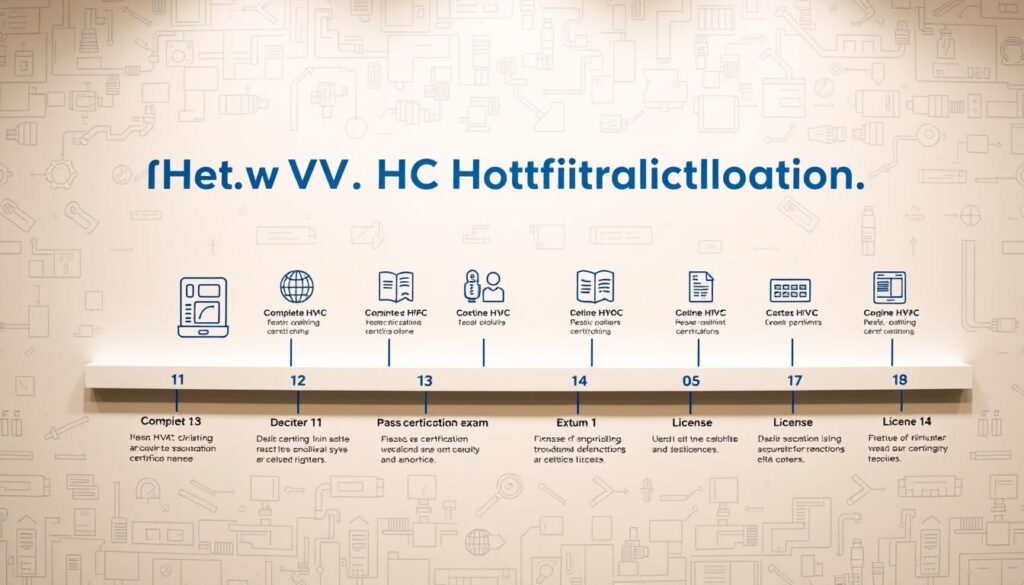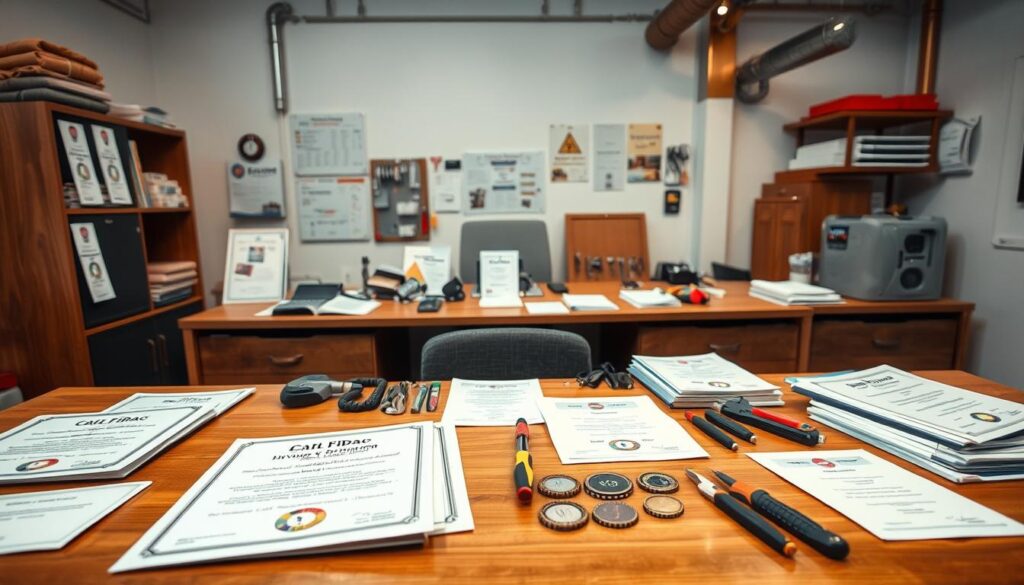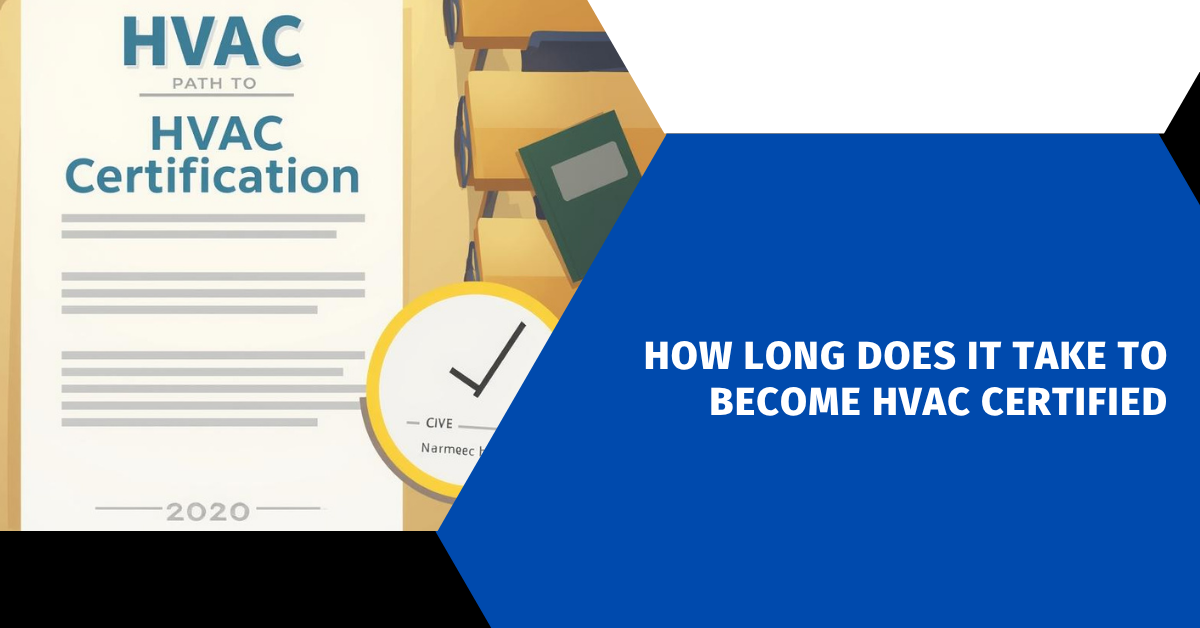Affiliate Disclosure
HVAC Guide Guys is a participant in the Amazon Services LLC Associates Program, an affiliate advertising program designed to provide a means for sites to earn advertising fees by advertising and linking to Amazon.
How Long Does It Take to Become HVAC Certified? Ever thought about turning your love for technical skills into a career in heating, ventilation, and air conditioning? Becoming HVAC certified is a tough but rewarding journey. But how long does it really take?

To get HVAC certified, you’ll need to go through training, gain practical experience, and keep learning. The time it takes can range from 6 months to 4 years. Knowing what it takes to become certified is key for those wanting to join this vital industry.
This guide will help you understand the steps to become a certified HVAC pro. We’ll break down each step and talk about the time you’ll need to invest in your career.
Key Takeaways
- HVAC certification timelines range from 6 months to 4 years
- Multiple training paths exist for aspiring HVAC technicians
- Practical experience is a critical component of certification
- Certification requirements vary by state and specialization
- Continuous learning is essential in the HVAC industry
Table of Contents
Understanding HVAC Certification Basics
To become an HVAC pro, you need more than just technical skills. Getting certified is key, showing you’re an expert and dedicated to your field. This process makes sure you can offer the best heating, ventilation, and air conditioning services.
What is HVAC Certification
HVAC certification proves you know your stuff and can do the job. It means you’ve finished special training, passed tough tests, and meet certain standards.
- Proves technical competence
- Validates professional skills
- Meets industry regulatory requirements
Why HVAC Certification Matters
“Certification is not just a piece of paper—it’s your passport to credibility in the HVAC industry.” – HVAC Industry Expert
Getting certified boosts your career. Employers like certified techs because they’re skilled and reliable. Your certification can open doors to:
- Higher salary
- More job chances
- Better professional standing
Basic Requirements for Starting HVAC Training
To start your HVAC career, you must meet some basic needs. These include:
- High school diploma or equivalent
- Minimum age of 18
- Basic math and reading skills
- Physical fitness for hands-on work
Understanding these basics is the first step in your HVAC journey. Each step gets you closer to a fulfilling career in this vital field.
Explore Our HVAC Shop
Looking for top-rated HVAC tools, parts, and accessories? Visit our shop and find the perfect solution for your needs.
Visit the ShopPre-Apprenticeship Training Duration and Requirements
Starting your journey to HVAC certification begins with pre-apprenticeship training. This first step is key to a successful HVAC career. Pre-apprenticeship programs usually last from 12 to 24 weeks, depending on the school and program.
This training covers important skills and knowledge for HVAC technicians. You’ll learn about:
- Basic electrical systems
- Refrigeration basics
- Safety rules
- How to use tools
- Reading blueprints
Training mixes theory and practice. You’ll spend about 70-80% of your time in hands-on training. This helps you develop skills you’ll use in real HVAC jobs.
| Training Component | Typical Duration | Focus Area |
|---|---|---|
| Classroom Instruction | 4-6 weeks | Theoretical knowledge |
| Practical Skills Training | 8-18 weeks | Hands-on technical skills |
| Safety and Professional Development | Ongoing | Industry standards and practices |
Completing a good pre-apprenticeship program sets you up for success. Invest in quality training to maximize your professional future.
How Long Does It Take to Become HVAC Certified: A Complete Timeline
Becoming an HVAC certified professional is a journey. It includes education, practical training, and exams. You need to plan well and work hard to learn the technical skills.
The time it takes to get HVAC certified varies. It can be 2 to 5 years. This depends on your education choice and local rules.
Course-Based Training Period
Your journey starts with formal education. You can pick from:
- Community college programs (6-24 months)
- Technical school certifications (6-12 months)
- Vocational training courses (3-9 months)
Apprenticeship Duration
The apprenticeship lasts 3-5 years. You’ll work with experienced technicians. This is where you learn by doing.
| Apprenticeship Phase | Duration | Key Learning Objectives |
|---|---|---|
| Initial Training | 1-2 years | Basic technical skills |
| Advanced Practical Training | 2-3 years | Complex system installations |
Certification Examination Timeline
After education and apprenticeship, you take certification exams. These exams last 2-4 hours. They test your technical knowledge and skills.
To speed up your certification, choose fast programs. Keep up with your training.
Types of HVAC Certifications and Their Timeframes

Understanding HVAC certifications is key to your career. There are many options to choose from. Each one offers a chance to grow your skills and stand out in the field.
What certifications you need depends on your goals and specialty. Most technicians get several to improve their skills and job chances.
- EPA certification for HVAC is a critical credential for working with refrigerants
- Entry-level technical certifications
- Advanced specialty certifications
- State-specific licensing credentials
EPA certification is a must for HVAC techs. It lets you work with refrigerants legally and shows you’re skilled. Here’s what you need to do:
- Complete required training courses
- Pass the EPA certification exam
- Keep your certification up to date with renewals
| Certification Type | Average Timeframe | Key Requirements |
|---|---|---|
| EPA Section 608 | 2-4 weeks | Technical knowledge exam |
| NATE Certification | 3-6 months | Industry experience |
| State Professional License | 6-12 months | Exam and work experience |
Getting multiple certifications can really help your career in HVAC. It boosts your credibility and pay.
Explore Our HVAC Shop
Looking for top-rated HVAC tools, parts, and accessories? Visit our shop and find the perfect solution for your needs.
Visit the ShopThe Apprenticeship Journey in Detail
Starting an HVAC technician training takes hard work and careful planning. Your apprenticeship will last several years. It mixes hands-on experience with classroom learning to prepare you well for the job.
The apprenticeship journey is a deep dive into learning HVAC skills. You’ll go through many important steps. These steps will turn you from a beginner into a skilled technician.
On-the-Job Training Hours
Your apprenticeship will include lots of hands-on training. You’ll need:
- 2,000-8,000 hours of supervised work
- Guidance from experienced technicians
- Real-world experience with HVAC systems
Classroom Instruction Requirements
You’ll also get classroom education. This will cover:
- Technical theory and system design
- Electrical and mechanical principles
- Safety rules and industry laws
Skills Development Milestones
As you go through your apprenticeship, you’ll reach key skill levels:
- Initial Learning Stage: Basic system knowledge
- Intermediate Proficiency: Advanced diagnostic skills
- Advanced Competency: Solving problems on your own
Your training as an HVAC technician usually takes 3-5 years. This depends on your program and area of focus.
Specialized HVAC Certifications and Additional Training

As you move forward in your HVAC career, getting specialized certifications can really help. These advanced credentials show you’re an expert in certain HVAC areas. They make you stand out in a crowded job market.
Looking into specialized HVAC certification requirements can lead to new career paths. Here are some advanced certification options to consider:
- Energy Efficiency Specialist Certification
- Commercial HVAC Systems Certification
- Renewable Energy HVAC Technologies Certification
- Industrial Refrigeration Certification
Each specialized certification needs extra training beyond basic HVAC skills. You’ll usually need to:
- Take specific technical courses
- Gain verified work experience
- Pass a detailed exam
“Continuous learning is the key to success in the HVAC industry. Each new certification represents a step toward professional excellence.” – HVAC Industry Expert
The North American Technician Excellence (NATE) certification is highly respected in the HVAC field. It proves your technical skills and dedication to growth.
Investing in extra training shows you’re serious about keeping up with new HVAC tech and rules. As new systems and rules come out, your ongoing education will keep you ahead in the HVAC field.
Cost and Investment Timeline for HVAC Certification
Getting an HVAC certification needs careful planning. You’ll spend money on your future career. Costs change based on your path through HVAC school and licensing.
Knowing the costs helps you get ready for your journey. Here are the main expenses you’ll face.
Training Program Expenses
HVAC training is a big upfront cost. Prices vary:
- Community college programs: $3,000 – $10,000
- Technical school certifications: $12,000 – $15,000
- Online training options: $1,500 – $5,000
Certification Exam Fees
Getting certified means more costs for exams:
- EPA Section 608 Certification: $50 – $150
- NATE certification exams: $100 – $250
- State-specific licensing fees: $50 – $300
Additional Equipment and Material Costs
You’ll need special tools and materials for training. Plan for:
- Basic tool kit: $200 – $500
- Protective equipment: $100 – $250
- Textbooks and study materials: $100 – $300
Pro tip: Many schools offer financial aid, scholarships, and payment plans to help with costs.
Explore Our HVAC Shop
Looking for top-rated HVAC tools, parts, and accessories? Visit our shop and find the perfect solution for your needs.
Visit the ShopCareer Advancement and Continuing Education
Becoming an HVAC professional is just the start. The HVAC world is always changing with new tech and rules. To keep up, you must keep learning and growing.
Your HVAC career can go in many directions. Here are ways to grow your career:
- Pursue specialized HVAC certification requirements in areas like:
- Commercial refrigeration
- Solar thermal systems
- Industrial equipment maintenance
- Attend industry workshops and conferences
- Complete manufacturer-specific training programs
- Explore advanced technical certifications
Professional growth in HVAC means staying ahead of technological trends. New systems are coming out all the time. By keeping up with your education, you’ll become more valuable and earn more.
Getting advanced certifications can make you stand out. For example, NATE certification shows you’re really skilled. It can lead to better jobs and more money.
“Continuous learning is the minimum requirement for success in the HVAC industry.” – Industry Expert
Investing in your education pays off big time. Many employers really value and reward technicians who keep learning and getting certified.
Conclusion
Knowing how long it takes to get HVAC certified is key for those thinking about this career. It usually takes 2-5 years. This includes learning, hands-on training, and getting certified.
Your hard work and love for the job will affect how fast you get certified. The HVAC field is growing fast. It needs skilled people to work on energy-saving systems and new climate control tech.
Getting special certifications from groups like HVAC Excellence and NATE can really help your career. These certifications show you’re highly skilled.
Planning your career and keeping learning are important. You can go to community college, vocational school, or an apprenticeship. Each way has its own benefits.
The most important thing is to pick a path that fits your goals and what’s needed in your area. HVAC techs are vital in homes, businesses, and factories. With the right training and keeping up with new tech, you can have a fulfilling career.
Your effort now will lead to success in this exciting field. HVAC careers offer great opportunities for growth.

